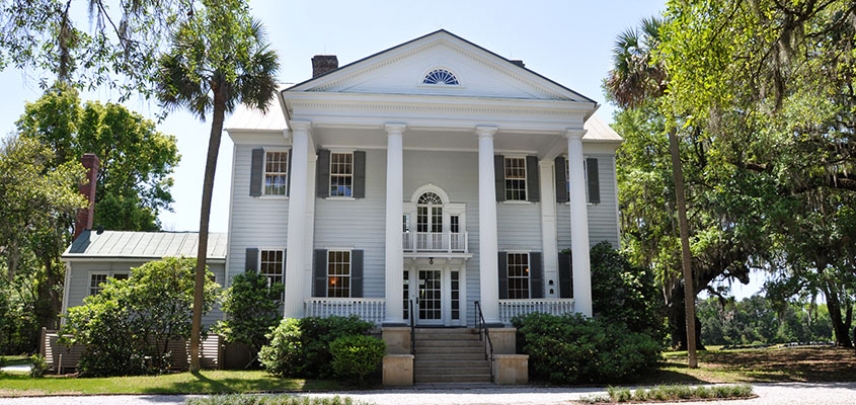When I moved to Charleston in 2003, my grandfather drove me all around town pointing out historic sites and areas of interest. When we made our way to James Island, he directed my attention to a row of white cabins just off Folly Road. It was McLeod Plantation. While a notable historical site, he wasn't sure what the status of the property was at the time. A number of years later, I moved to James Island. I passed those cabins on a regular basis, wondering about them often. This past Friday, years worth of curiosity were satisfied, when I got to tour the plantation a day before it officially opened to the public. I can't encourage locals to check this place out enough. It is a treasure trove of Charleston history.
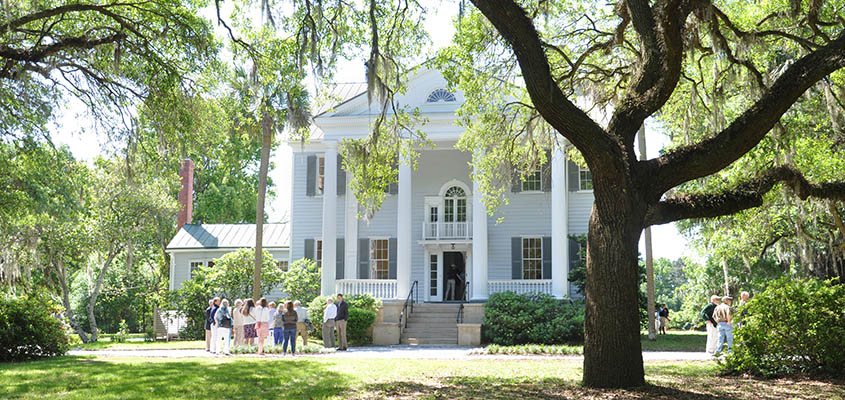 The columns were added to the back of McLeod Plantation for aesthetic purposes because McLeod didn't want people who saw the plantation from Wappoo Creek to be unimpressed with the house.
The columns were added to the back of McLeod Plantation for aesthetic purposes because McLeod didn't want people who saw the plantation from Wappoo Creek to be unimpressed with the house.
McLeod Plantation was named for William Wallace McLeod who acquired the property in 1851 from William and Edward Parker, ten years before the start of the Civil War. At that time, enslaved crafts people constructed a new plantation house. In the late 1700's, slaves had also built the cabins I had seen lined up in a row for years. Six cabins sit on the west side of the property now, but twenty-three resided on the plantation originally, crossing over modern day Folly Road and heading up the direction of Maybank Highway.
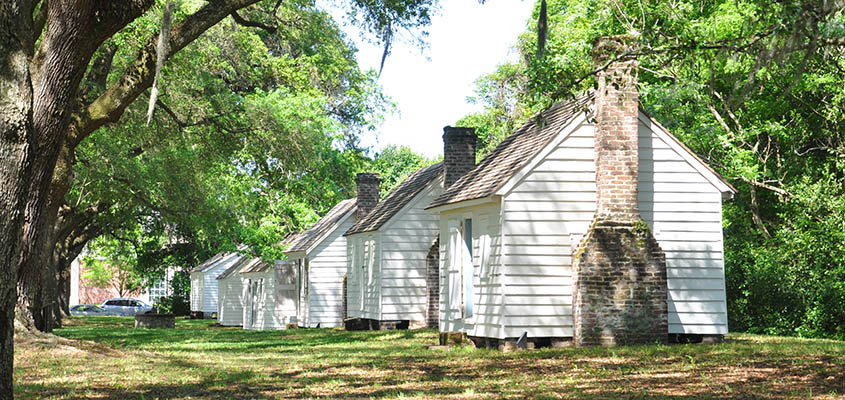 Rows of cabins built for the enslaved farmers of McLeod Plantation.
Rows of cabins built for the enslaved farmers of McLeod Plantation.
Originally a farm focusing on a potato crop, by McLeod's time the plantation had enslaved men and women cultivating sea island cotton. It was a shift that was certainly influenced by Eli Whitney's patenting of the cotton gin in 1794. Though the cotton gin must have helped slightly in day to day separation of cotton fibers from their seeds, the black men and women on the farm dealt with life during the period of Antebellum Slavery, know as a particularly harsh form of slavery. There are some who would reason certain plantation owners developed relationships over time with these men and women and treated them more kindly than historians would indicate. But as one tour guide at McLeod put it, "If you are participating in the act of enslaving people, how kind can you be?
By April 1861, the Civil War had begun. With the first shots being fired in Charleston, it was just a matter of time before there was a direct effect on the plantation. With 2,200 Confederate troops headed their way, the McLeod family evacuated with the vast majority of the enslaved. General States Rights Gist, a brigadier general for the Confederate army (after all, what other profession can you go into when your name is States Rights?) made the upstairs of McLeod the headquarters for his Confederate officers. The property proved to be valuable as it had a view of Fort Sumter, boat access, and was out of range of the Union army's gunboats. Downtown Charleston wasn't so lucky, as it got hammered with the longest bombardment in US history, 587 straight days of shells raining down on the city. Though the city was never overrun, the confederate troops were eventually redeployed. They were needed elsewhere as Union General William Sherman's army advanced in 1865.
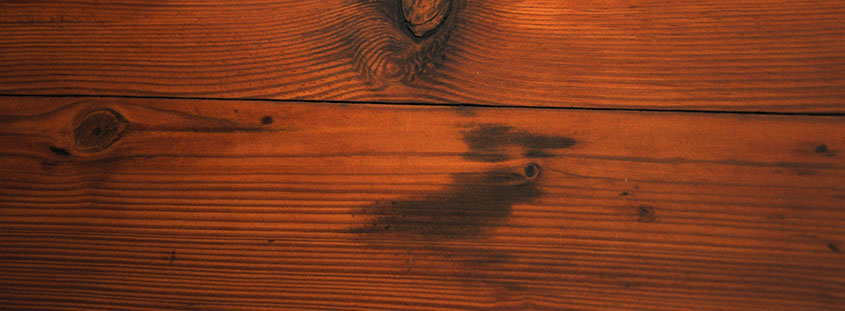 Diana Belknap, caretaker of the house from May, 2011 - July, 2013, pointed out this bloodstain on the hardwood floor of the plantation house dating back to when the first floor of the house was used as a hospital during the Civil War.
Diana Belknap, caretaker of the house from May, 2011 - July, 2013, pointed out this bloodstain on the hardwood floor of the plantation house dating back to when the first floor of the house was used as a hospital during the Civil War.
Shortly after the Confederate troops marched off James Island, the Union army marched in. Once again, McLeod Plantation served as the headquarters for military men, including the Massachusetts 55th and New York 54th. By April 1865, the war between the states was over, and the Thirteenth Amendment was signed in December 1865, formally outlawing the institution of slavery.
Despite their new found freedom, many of the previously enslaved were suffering alongside with plenty of other South Carolinians who were in crisis from a shortage of supplies and food, as well as steep inflation that had taken place during the war. Congress established The Bureau of Refugees, Freedmen, and Abandoned Lands in 1865 to assist with the humanitarian crisis. The Freedmen's Bureau initially gave plots of land to a number of the formerly enslaved, who began farming the land at McLeod once again. By 1970, William Wallace McLeod Jr. had returned to James Island a number of years after his father's death to take back his family's land.
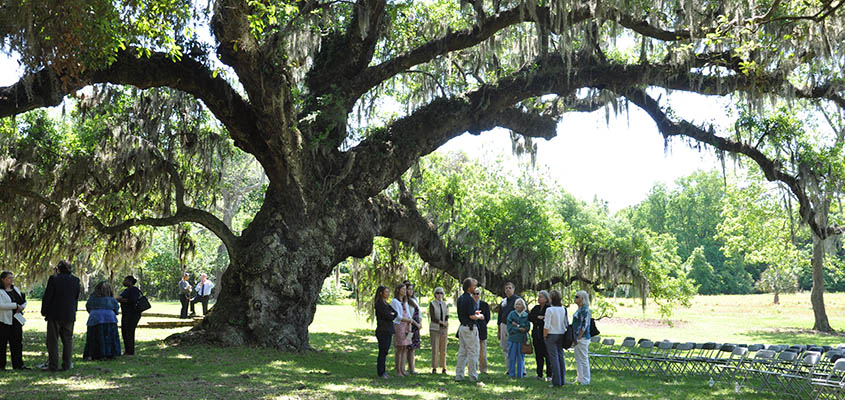 One of the magnificant oaks on the plantation's property.
One of the magnificant oaks on the plantation's property.
Sea Island Cotton was gone by the late 1910's due to the destruction of the boll weevil, but McLeod Plantation became a successful farm for corn, sweet potatoes, and asparagus. The row houses that had served as homes for the enslaved transitioned through time. Some deteriorated and fell apart. Some were torn down as portions of the plantation were sold off by William E. McLeod. Still others acted as homes for share croppers, mission houses, and rental property. In fact, some of the homes remained rentals until 1990, a staggering fact considering their size and the fact that only one of the cabins had plumbing.
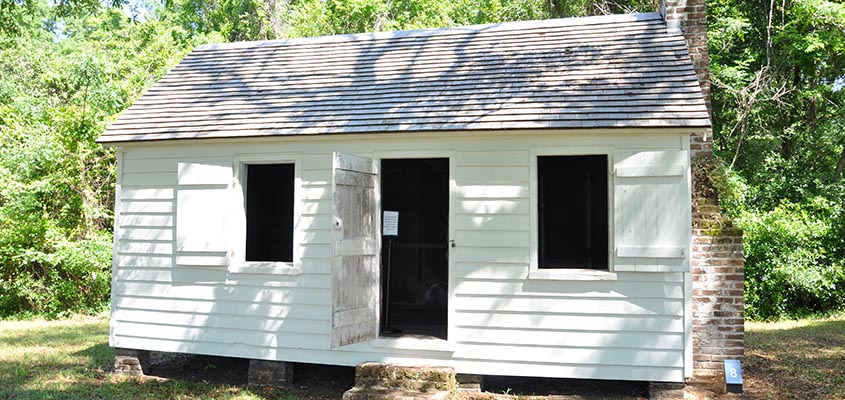
One of the cabins that served as a rental property up until 1990.
Having no heirs, William E. McLeod left the property to the Historic Charleston Foundation after his death in 1990, hoping the organization would help preserve the property's history and protect it from development. The foundation decided to sell the plantation to the American College of Building Arts to use as a campus, but financial instability caused the college to sell the property back to the foundation shortly after. In 2010, the Charleston County Parks and Recreation Commission purchased the property. After a lengthy and careful restoration by Charleston County Parks, it opened to the public April 25th. McLeod Plantation will remain open to the public Tuesdays - Sundays from 9:00 am - 4:00 pm. Adult admission is $10 and children ages 3-12 are $6. Gold Pass holders and children aged 2 and under are free of charge.
sources: Charleston County Parks and Recreation, Sciway, the History Channel

Audra Gibson
Audra Gibson is a Christian, photographer, surfer, and a lover of teriyaki steak bites. She enjoys live music, doesn't like to be cold, and she's a bit of a cheese snob. Traveling Ink was her little brain child and she's very happy that you're here. She'd be oh so happy to recommend her favorite tours and attractions in town, help you with a team building event, or organize a day (or week) of fun for you and your group.
Website: www.audragibson.com
